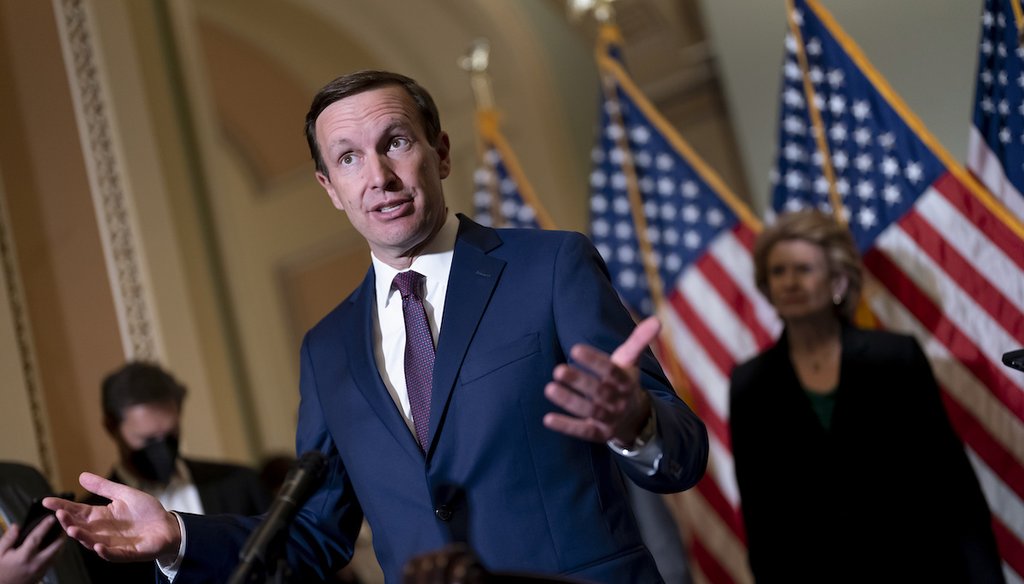Stand up for the facts!
Our only agenda is to publish the truth so you can be an informed participant in democracy.
We need your help.
I would like to contribute

Sen. Chris Murphy, D-Conn., speaks to reporters outside the chamber to answer questions about his efforts to reach a bipartisan Senate agreement to rein in gun violence, June 14, 2022. (AP)
If Your Time is short
-
A group of 10 Democrats and 10 Republicans in the Senate outlined a gun legislation proposal after the deadly elementary school shooting in Uvalde, Texas.
-
The proposal does not represent the final language the Senate will vote on, but it does provide insight into what the bill might include.
-
The proposal includes the federal government giving states money to establish red flag laws, enhancing the background check system for people under 21 years old and increasing funding for mental health and school safety.
-
Some of the ideas are taken from existing state laws. Other ideas need more details to be fully understood.
A bipartisan group of 20 senators has outlined a gun legislation proposal in hopes of making mass shootings less likely in the United States, following the May 24 deadly elementary school shooting in Uvalde, Texas.
To pass the Senate, a bill needs at least 60 senators to support it. The bipartisan support of 20 senators behind the proposal suggests it might overcome a filibuster.
The House of Representatives passed two related bills on June 8 and 9. However, both bills are expected to fail in the Senate.
Some of the ideas in the Senate proposal have been successfully test-piloted in states. Other ideas lack enough detail to fully understand them.
While the drafting of the Senate legislation could take weeks, here’s an overview of the provisions that the senators on June 12 said they would support.
Incentivize state red flag laws
"Red flag" laws allow people to petition a state court to order the temporary removal of firearms from a person who might present a danger to themselves or others.
The bipartisan group of senators is not calling for a federal red flag law. But they support funding to incentivize states to create their own "state crisis intervention orders" (another term for red flag laws).
These laws, also called extreme risk protection orders or gun violence restraining orders, exist in 19 states and Washington D.C.
Opponents of red flag laws argue that they infringe on due process rights. In response to this concern, Sen. John Cornyn, R-Texas, one of the senators leading the Senate’s gun legislation negotiations, said on June 13 that grants for states’ red flag laws would be dependent on a due process provision.
Funding would also go toward educating the public about red flag laws.
"Jurisdictions with the most success have benefitted from significant investments in ensuring that law enforcement receive training, courts develop protocols, and the public is aware of the availability" of red flag laws and their procedures, according to a statement from Giffords, the gun violence prevention organization led by former U.S. Rep. Gabrielle Giffords.
In California, Democratic Gov. Gavin Newsom recently announced an $11 million,18-month campaign, focusing on outreach and education about the state’s red flag law.
Improve the background check system
The Senate’s proposal would require a period of time to review juvenile and mental health records for potential gun buyers under 21 years old.
Under federal law, licensed firearms dealers have to perform a background check on buyers. This is done through the FBI’s National Instant Criminal Background Check System. However, a background check completed through NICS could be missing mental health records and juvenile convictions if a state has not submitted that information to NICS.
Cornyn, before the proposal became public, said the bipartisan group of senators was exploring ways to encourage states to upload juvenile records so they would be included in background checks.
"This is standard practice in some, but not most states," Cornyn said on the Senate floor on June 8. "And it’s easy to see why it’s important."
According to Giffords, 27 states prohibit people from purchasing firearms for a period of time after being adjudicated or convicted of certain offenses as juveniles.
When it comes to mental health records, 47 states have laws authorizing or requiring mental health records be submitted to NICS.
Close domestic violence loopholes
Federal law bars anyone convicted of a felony from owning a firearm.
The law also bars anyone convicted of domestic violence or people on the receiving end of a restraining order from owning a gun if they lived with, were married to or had a child with a domestic violence victim. But this restriction does not apply to people who are dating, and this is what is commonly called the "boyfriend loophole." The bipartisan group of senators is proposing getting rid of this loophole that allows abusive dating partners with domestic violence convictions or restraining orders to still possess a gun.
Some states have passed laws to partially or completely close this loophole.
Federal law against straw purchasing and gun trafficking
Straw purchases happen when someone buys a gun on behalf of someone else. The straw purchaser in this scenario tells the seller they will be the owner of the gun.
These purchases are illegal under federal law.
The Senate proposal aims to "crack down" on straw purchases and gun trafficking, but does not detail how it would do so.
Clarify definition of a ‘federally licensed firearms dealer’
Under federal law, performing background checks and maintaining records of all gun sales are only required for "federally licensed firearms dealers."
A 1986 federal law defined these licensed dealers as "a person who devotes time, attention, and labor to dealing in firearms as a regular course of trade or business with the principal objective of livelihood and profit through the repetitive purchase and resale of firearms."
This definition excludes people who make occasional sales or sell firearms as a hobby, so they’re not required to run background checks on potential buyers.
While the Senate proposal does not include universal background checks, it calls for clarifying the definition of federally licensed firearms dealer to ensure the law "cracks down on criminals who illegally evade licensing requirements." The proposal does not specify the new definition.
This change will "make sure that everyone who is engaged in the repeated for profit sale of firearms has to perform background checks," said Sen. Chris Murphy, D-Conn., during a press conference on June 13.
Increase funding for mental health and school safety
In a Twitter thread further explaining the bipartisan agreement on June 12, Murphy said the proposal would include an investment of billions of dollars in funding for mental health and school safety resources.
🚨NEWS: We have a deal. Today a bipartisan group of 20 Senators (10 D and 10 R) is announcing a breakthrough agreement on gun violence - the first in 30 years - that will save lives.
— Chris Murphy (@ChrisMurphyCT) June 12, 2022
I think you’ll be surprised at the scope of our framework.
1/ Here’s what it includes:
For example, states would be able to receive funding for Certified Community Behavioral Clinics that provide mental health and substance abuse services.
It’s unclear whether such funding will address the nationwide shortage of mental health professionals. More than one-third of Americans live in areas lacking mental health professionals. And nearly 7,000 additional health providers would be needed to fill this gap.
The bipartisan group of senators say they want resources to "support school violence prevention efforts and provide training to school personnel and students."
How much funding would be allocated toward those efforts is unclear.
Next steps in the Senate
President Joe Biden said in a June 12 statement that he supported the bipartisan Senate proposal and that it "would be the most significant gun safety legislation to pass Congress in decades."
At this point, it’s unclear when the bill will be voted on by the full Senate. It would also require formal approval from the House of Representatives.
Negotiations in the Senate are expected to continue and the bill’s final language is still to be determined, but Democratic and Republican Senate leaders have expressed their support.
"With bipartisan support, there are no excuses for delay, and no reason why it should not quickly move through the Senate and the House," Biden said in his statement. "Each day that passes, more children are killed in this country: the sooner it comes to my desk, the sooner I can sign it, and the sooner we can use these measures to save lives."
Staff writer Nuria Diaz Muñoz contributed research to this article.
RELATED: All of PolitiFact’s fact-checks on guns
RELATED: Ask PolitiFact: What are red flag gun laws and do they keep people safe?
Our Sources
Bureau of Alcohol, Tobacco, Firearms and Explosives, "Gun Control Act," accessed June 14, 2022
Bureau of Alcohol, Tobacco, Firearms and Explosives, "Federal Firearms Licensee Information Service Newsletter", June 2021
Chris Murphy, Bipartisan Group of Senators Announce Agreement, June 12, 2022
Chris Murphy, Murphy Lays Out Bipartisan Gun Safety Framework, June 13, 2022
Chris Murphy, Twitter Post, June 12, 2022
Chuck Schumer, Tweet, June 12, 2022
Congress.gov, "S.49 - Firearms Owners' Protection Act," accessed June 14, 2022
Debbie Stabenow press release, "Senators Stabenow, Blunt Lead Mental Health Initiative in Bipartisan Proposal," June 12, 2022
Giffords Law Center, "NICS & Reporting Procedures," accessed June 14, 2022
Giffords Law Center, "Firearm prohibitions," accessed June 14, 2022
Giffords Law Center, "Mental Health Reporting," accessed June 14, 2022
Giffords Law Center, "Background Check Procedures in Pennsylvania," September 15, 2021
Giffords Law Center, "Domestic Violence and Firearms," accessed June 14, 2022
Giffords Law Center, "Senate Proposal on Gun Violence Prevention," accessed June 14, 2022
IndyStar, "Red Flagged: IndyStar’s investigation on Indiana gun laws," December 15, 2021
Legal Information Institute, "18 U.S. Code 922 – Unlawful Acts," accessed June 14, 2022
Mitch McConnell, McConnell Supports Ongoing Cornyn, Murphy Bipartisan Negotiations, June 12, 2022
Nancy Pelosi, Pelosi Statement on Bipartisan Gun Violence Prevention Framework Agreement in Senate, June 12, 2022
National Council for Mental Wellbeing, "What is CCBHC?," accessed June 14, 2022.
Office of Governor Gavin Newsom, "Governor Newsom Launches New Initiative to Protect Californians from Gun Violence," June 3, 2022
PolitiFact, "Ask PolitiFact: What are red flag gun laws and do they keep people safe?," June 10, 2022
PolitiFact, "Federal law’s ‘boyfriend loophole’ is not so simple," August 22, 2019
Supreme Court Opinion, "Abramski v. United States," October 2013
U.S. Department of Justice, Federal Firearm Licensee Information service Newsletter, June 2021
USAFacts, "Over one-third of Americans live in areas lacking mental health professionals," June 9, 2021
White House press release, "Statement by President Biden on Bipartisan Senate Gun Safety Proposal," June 12, 2022
Youtube, "Sen. John Cornyn Discusses Framework for Negotiations on Mental Health, School Safety," June 13, 2022.
Youtube, "Sen. John Cornyn Gives Update on Negotiations on Mental Health, School Safety After Mass Shootings," June 8, 2022
County of Santa Clara, An Additional Tool for Mental Health: Assisted Outpatient Treatment Services Now Available in Santa Clara County, Feb, 23, 2022
Press release, Cornyn: ‘No National "Red Flag" Law’, June 14, 2022
Congressional Research Service, Submission of Mental Health Records to NICS and the HIPAA Privacy Rule, April 15, 2013
Department of Justice, Executive Summary: The Reporting of Information to the National instant Criminal Background Check System (NICS) and Review of ATF Form 4473, accessed June 15, 2022
Youtube, Sen. Chris Murphy begs for gun control on Senate floor after deadly Texas school shooting, May 24, 2022
United States Senate, About Filibusters and Cloture, accessed June 15, 2022
Congress.gov, Vote on H.R.7910 - Protecting Our Kids Act, June 8, 2022
Congress.gov, Vote on H.R.2377 - Federal Extreme Risk Protection Order Act of 2021, June 9, 2022


































